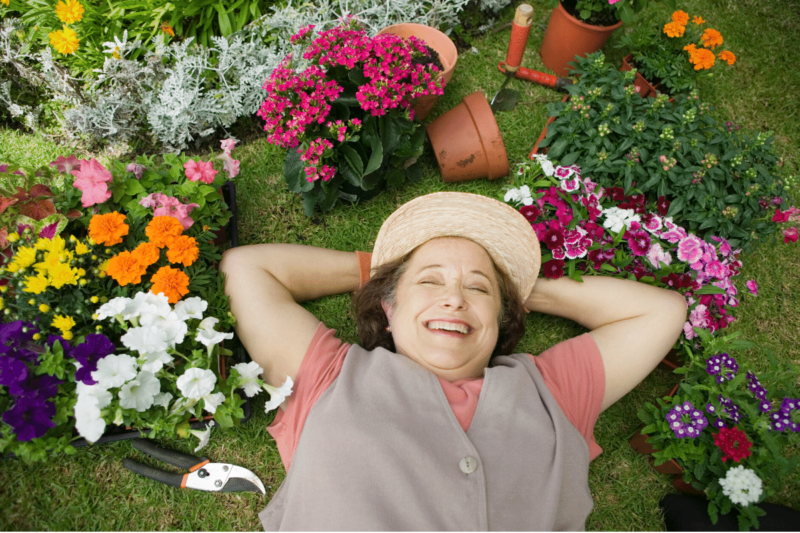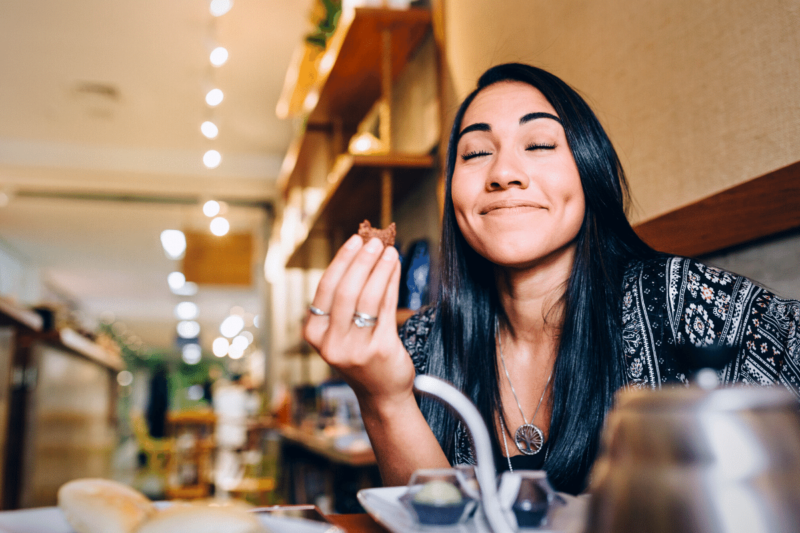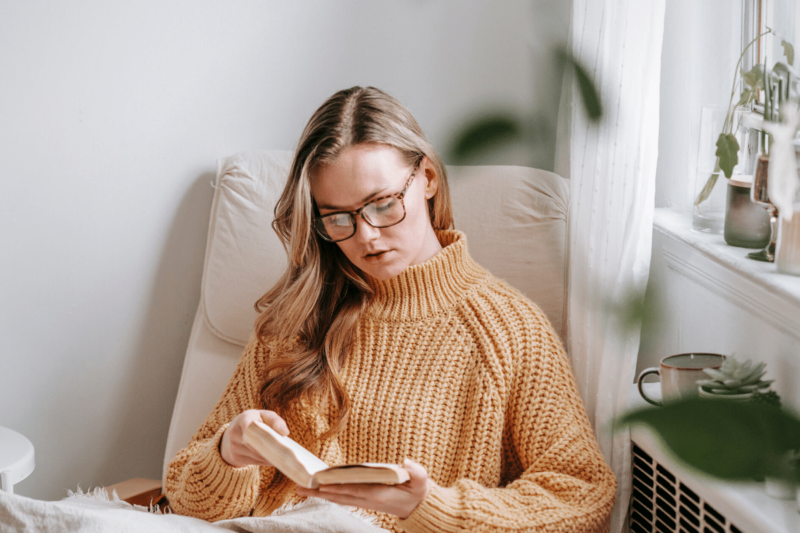
I’ve written quite a bit about why it’s not just OK, but important to find pleasure in food. What I haven’t written about, surprisingly, is about why it’s important to find pleasure from life. Surprisingly, because this is something I talk to my clients about quite a bit (I even have questions on my intake form about what they do for fun and to express creativity).
We need pleasure, satisfaction and joy in our lives, and if we don’t have it, then it’s very easy to lean on food to meet those very human needs.
I had already planned to write this post when a client shared with me that she was starting to be more aware of a connection between how engaged she is in artistic pursuits and how challenging her relationship with food is. When she’s not fulfilled creatively, she said, she puts more pressure on herself to identify exactly what it is she wants to eat. When she is fulfilled creatively, she can simply prepare something tasty and nourishing without feeling like it needs to be the perfect meal.
I told her she’s not my only client to express something along those lines.

Putting your pleasure eggs in multiple baskets
When I talk about emotional eating, I try to be nuanced, because it is not a black-or-white topic. It’s perfectly normal to eat for comfort, for celebration, or for other emotional reasons. Where emotional eating becomes concerning when someone does it compulsively or automatically rather than making an actual choice (in other words, they’re reacting to emotions rather than responding).
It can also become a problem when food is someone’s ONLY coping tool. When that’s the case, then thank goodness they have food (and thank goodness they’re using food and not, say drugs or alcohol or risky behavior), and…there are cases where using food may be like using a Band-Aid when you need stiches. If you’re struggling with depression, anxiety, loneliness, stress, boredom or fear (to name a few emotions and states of being), then finding a more impactful way to solve or manage the underlying issue is a better long-term solution. And to bridge the gap, there’s still food.
But back to pleasure.
There are so many ways — big or small — in which humans can get pleasure. Music. Films. Good books. Hugging a partner or loved one. Petting a dog or cat. Being in nature. Dancing. Drawing or coloring. Feeling water on our skin. Genuinely laughing. Getting a massage. Seeing a baby smile (especially if it’s your baby). Being in a cozy bed on a cold morning. Wiggling bare toes in green grass. Sexual or other intimate physical contact. Watching a beautiful sunset (or sunrise). Eating or drinking something delicious.
Not all of these apply to all people, but you get the idea.
But if we tried to meet all of our pleasure needs from any one thing, that would be imbalanced. That’s true whether that thing is food or bird watching or shopping.

Consider the senses
If you’re not sure on what gives you pleasure (other than food), consider the five senses:
- Sight: What do you see when you look around the spaces where you spend the most time? Is it as minimalist or maximalist as you would like? Do the colors and artwork appeal to you? Can you see green living things (indoors or through a window)?
- Smell: What do you smell? Are there unpleasant smells? If you smell fragrance, is it appealing or is it too much? Do you like the fragrance? Are you able to allow fresh air indoors? If you enjoy wearing fragrance and/or scented skin and hair care products, do you like the scents, or are you “using up” something purchased for you that you didn’t choose?
- Sound: If you enjoy music, do you play it as much as you would like, or do you forget? Are their sounds from inside or outside that are too loud, distracting or stimulating (and could you do something to block or cover those sounds)?
- Touch: Think of everything that you touch, or touches you. Clothing, towels, bedding, upholstery and throw pillows, flooring, soap and other skin care products. Do you like the feel of these things against your skin? Does your clothing fit you the way you like, whether that’s structured, stretchy or flowing? Are your shoes comfortable? If you have a romantic partner, do they touch you the way you like? Do you have enough human touch in your life?
- Taste: Think of all the things that cross your tastebuds, not just food, but beverages (coffee, tea, flavored water, alcohol, even your tap water)? Do you choose appealing foods most of the time. If you enjoy tea, do you keep your favorites on hand? If you choose to drink alcohol, do you choose what you enjoy, not just what’s available? Would you drink more water if you flavored it with slices of citrus, ginger or cucumber, or maybe with fresh mint leaves?

What else “feeds” you?
This isn’t a sense, but I would add activities that feed the mind, the soul, or both: creative expression, learning, and social connection.
Creative expression can feed both mind and soul, allowing you to achieve a “flow state,” a state of total immersion in an activity. (This state is often associated with creative tasks, such as writing, drawing or painting, but it can also happen while engaging in a physical activity, such as dancing or running.) Being in a flow state makes activities more enjoyable, but also has a number of other cognitive and psychological benefits.
Learning certainly feeds the mind, but it can also feed your soul. “Learning” could be educating yourself by taking courses or reading non-fiction books and articles on topics you find interesting. Or, it could be reading works of fiction and “losing yourself” in a good story. You might find that certain writers appeal to you more if their descriptions lean toward the sensory elements that you find most pleasurable. Learning can also be “experiential,” such as when you take up gardening and learn through trial and error what plants you like and how to grow them, or when you decide to learn to play an instrument, speak a foreign language, or bake bread.
Social connection most obviously feeds the soul, especially when we connect with people we know well and share a mutual love and respect (being with “toxic” family or frenemys is not a source of pleasure). However, the art of conversation is a skill that we can learn and grow, so stimulating conversation even with people we don’t know well can feed the mind, especially if we learn something new in the process. (I realize that for some people, including those with social anxiety, conversing with new or newish people may feel more stressful than nourishing, thus draining pleasure from your life.)

Taking a “pleasure inventory”
Do you feel like you need more pleasure in your life? Or, perhaps you are noticing specifically that food is your primary source of pleasure? Consider taking an inventory of areas of your life where you can bring in more pleasure.
There are many sources of pleasure that take intention and some effort, but little money, while there are others that do, frankly, take some money. If your budget is tight could you:
- Stop wearing your most uncomfortable pairs of shoes?
- Buy one versatile item of clothing in a fabric and fit that feels good?
- Buy a throw pillow in a color you love (even if you can’t replace your ugly couch)?
- Get rid of that framed poster you don’t like anymore, even if you can’t replace it yet?
- Tidy up your yard even if you don’t have a budget for new plants?
- Clear clutter from the counters in the kitchen you hope to eventually renovate?
- Stop wearing that perfume that you really never really liked even though you spent “good money” on it (or it was a gift)?
- Stop making yourself eat “healthy” foods that you don’t like the taste or texture of?
- Buy pillowcases that feel good against your cheek, even if you can’t replace all your scratchy bedding?
- Read the books you want to read rather than the books you “should” read?
- Spend more time in public green spaces?
- Play your favorite music more often…and maybe dance to it?
Just some food for thought!
Carrie Dennett, MPH, RDN, is a Pacific Northwest-based registered dietitian nutritionist, freelance writer, intuitive eating counselor, author, and speaker. Her superpowers include busting nutrition myths and empowering women to feel better in their bodies and make food choices that support pleasure, nutrition and health. This post is for informational purposes only and does not constitute individualized nutrition or medical advice.
Seeking 1-on-1 nutrition counseling? Carrie offers a 6-month Food & Body program (intuitive eating, body image, mindfulness, self-compassion) and a 4-month IBS management program (low-FODMAP diet coaching with an emphasis on increasing food freedom). Visit the links to learn more and book a free intro call to see if the program is a good fit, and if we’re a good fit!
 Print This Post
Print This Post
